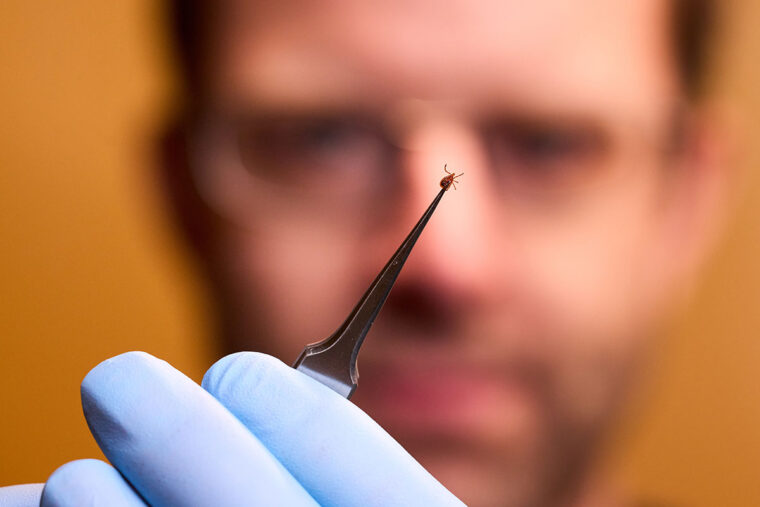
Before venturing out into the woods, a nearby park or even your backyard, keep an eye out for mosquitoes and ticks, which can be vectors, or carriers, for pathogens that can cause disease.
Here, experts Solny Adalsteinsson and Katie Westby explain what risks these pests pose to you and your pets and share how to stay safe this summer. Both Adalsteinsson, who is studying strategies to reduce the spread of tick-borne disease, and Westby, who studies the ecology and evolution of container mosquitoes, i.e. those that breed in trash and in flower pots, are staff scientists at Tyson Research Center, Washington University in St. Louis' 2,000-acre environmental field station in west St. Louis County.
How does the Midwest differ from other parts of the country in terms of tick and mosquito prevalence and potential illness?
Adalsteinsson: Across the United States, Lyme disease is the most common vector-borne disease. But we don't see much Lyme disease here. Rather, most of the diseases that you'd be at risk of are the ones that are transmitted by the lone star tick and the American dog tick. Those include ehrlichiosis and rickettsiosis, which can present with symptoms including headache, fever, chills, nausea, rashes and muscle aches.
One condition I think more people are becoming aware of - and is definitely more of a risk here and in the southeast U.S. - is an allergic condition that can be triggered by a lone star tick bite. It's called Alpha-gal syndrome and it sensitizes people to become allergic to mammalian meats and other mammalian-derived products, such as milk, butter and some medications.
Bourbon virus and Heartland virus also have emerged in Missouri in the last 10-15 years, and we still know very little about them. So, we're doing some collaborative studies with virologists and wildlife veterinarians to understand what species are involved in transmitting those pathogens and what ecological factors play a role in their prevalence.
Westby: For mosquitoes here in Missouri, it's very similar to what you would find further east. Fortunately, right now in the U.S., we don't have many cases of mosquito-borne illness in humans. Every year we have West Nile virus, which is endemic and is pretty much everywhere in the country. One of the problems that we do have here in Missouri is heartworm, which is transmitted by mosquitoes, so that's a big issue for our pets.
How can you best avoid getting bitten by ticks and mosquitoes?
Westby: Use permethrin and DEET. And we recommend lighter clothing and covering yourself. That said, mosquitoes can bite through thin clothing.
Adalsteinsson: Permethrin products not only repel insects and ticks but can kill them on contact. Permethrin products need to be sprayed onto clothing or gear and allowed to fully dry. In Missouri, there's really no season that's not tick season. Fortunately, ticks don't fly or jump; they're not up in the trees.
Think about creating a barrier between your skin in order to give yourself more time to spot them before they find a place to bite. That looks like wearing closed-toe shoes, wearing long socks and tucking your pants into socks or even wearing gaiters over your pants. And when you come in from the outdoors, just check yourself over really well in every crevice that you can think of.

What should you do if you find a tick attached to your body?
Adalsteinsson: To start, don't panic because not all ticks are carrying a pathogen that could make you sick. It's usually a minority of ticks that actually have something in them that can cause disease. If they do have something, the risk of transmitting it goes up the longer that they're feeding.
I recommend using fine-tipped tweezers as close to the skin as possible to get the full tick out. Then sanitize the bite site with soap and water.
An additional precaution you could take is to freeze the tick in a Ziploc bag, labeling it with the date that you found it and where it was on your body. There are labs that can then test the tick. I generally wouldn't recommend doing that unless you actually get sick. Otherwise, you might be worrying yourself unnecessarily.
What purpose do mosquitoes serve in our ecosystems?
Westby: I would like to flip this question around because it's coming from a very human perspective. Just because we don't like mosquitoes doesn't mean that they need a human 'purpose.' They exist because they exist. If you're a virus transmitted by mosquitoes, you'd be pretty bummed if they went away.
The mosquitoes that transmit diseases to humans in our urban environment don't have much of an ecological role. They're not really eaten by bats that much. In their aquatic habitats, they will get eaten a little bit by dragonflies and other mosquito larvae, but they don't play a huge role in our urban habitats. Now the mosquitoes that live in the woods definitely are eaten by bats and other creatures as part of the food chain and have a role in the forest ecosystem. They are also pollinators to a small degree.






